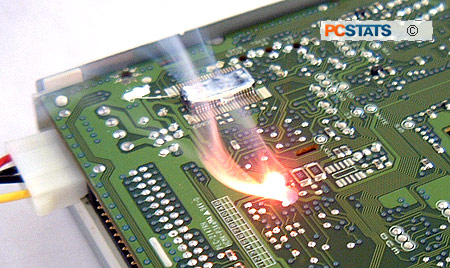Beginners Guides: Most Common Ways to Kill a PC
PCstats guides you through the list of the most popular ways by which you will eventually kill your PC, despite your
good intentions. This is a good primer for "what not to do" folks. - Version 1.3.0
Computers should be essentially immortal right? They are just a collection
of circuits and signals, and as long as power flows to them, they should
continue to operate; there's nothing to break down, nothing to age... uh-huh.
Anyone who's ever owned a computer knows that this is not quite
true.
Computers and their component parts do have a finite life span, and just like
us, they have a list of afflictions that are most likely to claim their digital
existences. Also just like us, most of these problems stem from careless
handling, neglect, unhealthy environments and old age. Toss careless
manufacturing into the mix, and you can see why the average computer system
rarely survives more than ten years without some sort of catastrophic
failure.
Ordinarily, this brief lifespan would not be of concern, since
the average useful life of a computer system, the time in which it is still
relevant and capable of running the software of the day, is far shorter,
five years tops. The thing is though, careless handling can cut
your computer down while it is still in its prime. I know this is true, I
worked in a computer store. Chances are anyone who has ever owned more
than one computer has experienced some sort of unexpected computing catastrophe
from a system that still had years of useful life left to it.
 A while back PCSTATS asked its readership a pretty simple question; "have
you ever killed your PC?" Hundreds of stories flooded in, encompassing everything from standard computer failures to tales of blue smoke
and fire.
A while back PCSTATS asked its readership a pretty simple question; "have
you ever killed your PC?" Hundreds of stories flooded in, encompassing everything from standard computer failures to tales of blue smoke
and fire.
If you
had a story about a system that died unexpectedly, or that you killed, we
wanted to hear it. To say that we were overwhelmed
by the responses would be an understatement. So before we go on, I'd
just like to say "thank you!" to everyone who took the time to share
their story. As it turns out there have been plenty of PC's accidentally killed, hundreds of CPU's fried, and more than a few
power supplies unceremoniously cremated.
Most Common Problems
26% PSU and power issues
23% Bad gear and user negligence
13% Heatsink related
15% Assembly and moving
10% Lightning strike and static
3% Computer cruelty
6% USB related
2% Overclocking
|
Out of all these tales, one
thing became clear; sometime soon, one of your computers or one of its essential components
is going to get fried and fail. So here are the most common ways this is likely
to happen!
The Power Supply (PSU)
Three little words, but loaded with such destructive potential. Faulty power supplies
are by far and away the most common source of computer mortality. In our
reader survey, power issues accounted for over 30% of all
dead-PC tales, and after working in a computer store for a few years I'm surprised it
wasn't actually higher. We saw system after system come into the store for service
with the immortal words "it just won't turn on" or "smoke came out of the back...
Will it be ok?"
Here's a typical tale of bright lights,
big balls of smoke;
"...The customer came in saying that the PC wouldn't
start at all. Of course I suspected the PSU, but had to test it anyway. Plugged
in the unit and pushed the power button and was illuminated by a flash of light.
The PSU had indeed failed, and now had also blown a MOSFET on the system board
and scorched the 512mb stick of PC3200 RAM..."
That the power supply is the most
dangerous of PC components should come as no surprise. After all,
its responsibility is to filter the massive wall voltage into the
bite-sized 12V, 5V and 3.3V DC allocations that modern PCs need.

